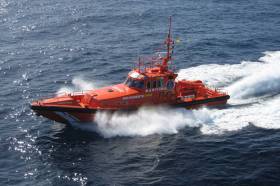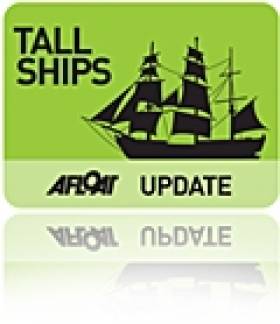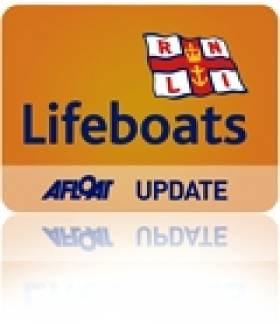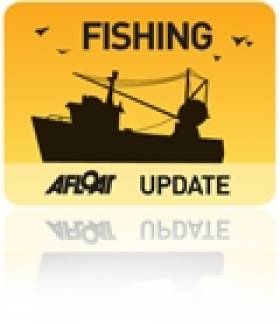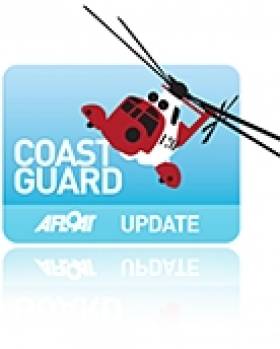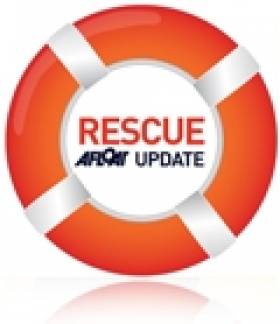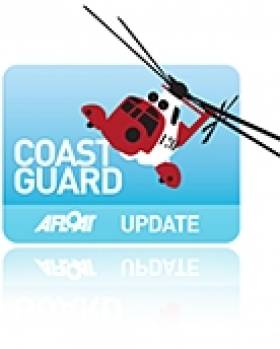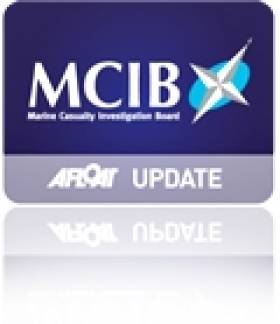Displaying items by tag: sinking
Irish Crew Rescued After Motor Yacht Sinks Off Northern Spain
The Irish crew of a motor yacht were rescued after their vessel took on water and sank off the coast of Northern Spain on Friday (9 August).
Afloat.ie has learned from its skipper Vincent Duke that the Sujo, a Maltese-registered Fisher 37, was en route from A Coruña to Valentia Island at around 2am on Friday morning when a catastrophic failure of its stern gland cased the vessel to flood north of San Cibrao.
Duke and his crew Fergus Comerford and Mariusz Rozmus were picked up from their half-sunken vessel by the Spanish search and rescue vessel Salvimar Alioth.
The fate of the boat since the incident is currently unknown, as reported by regional newspaper La Voz de Galicia.
Four RNLI Lifeboats Rescue Crew From Sunken Tall Ship Astrid
#TallShips - Four RNLI lifeboats were involved in the rescue of 30 crew from the tall ship Astrid, which sank off the Cork coast earlier today (Wednesday 24 July).
The 42m Dutch training vessel reportedly hit rocks inside the Sovereign Islands at Ballymacus Point, near Kinsale.
All on board were brought to safety when the Kinsale lifeboat transferred the casualties from the sinking ship onto the Courtmacsherry RNLI lifeboat and a local vessel. They were then taken to Kinsale.
Both Kinsale and Courtmacsherry RNLI lifeboats were called out at 12 noon today to go to the immediate aid of the sail training vessel that had got into difficulties on the western entrance to Kinsale Harbour in Cork.
Ballycotton and Crosshaven RNLI were also launched, though the Kinsale RNLI lifeboat was first on scene. There was a 2m swell and winds were force five to six.
The training vessel had lost power and was apparently driven on to rocks by a strong southerly wind at the western entrance to Kinsale Harbour. The grounded vessel was taking on water and a crewmember from Kinsale RNLI was put onboard.
Eighteen of the casualties were taken off the Astrid by Kinsale RNLI lifeboat and transferred to Courtmacsherry lifeboa, before being brought to safety. The remaining 12 were put onto a liferaft deployed by the Astrid’s crew, which was towed to safety by the Kinsale lifeboat and picked up by a local vessel.
The people on board the liferaft were then taken to Kinsale harbour and assessed by medical teams.
Irish Coast Guard helicopters from Waterford and Shannon were also on scene along with ambulances and medical crews from Cork.
Speaking about the call-out, Courtmacsherry RNLI coxswain Sean O’Farrell said: “Everyone was very fortunate. I want to praise the quick thinking of the skipper and the crew from the Astrid. They kept calm and did everything we asked them to do. We were able to get them to safety quickly and a major tragedy was averted. To be able to recover 30 people safely was a great day for everyone involved.”
Meanwhile, the Irish Sailing Association has issued the following media statement on behalf of the tall ship Astrid:
Tall Ship Astrid was on a voyage from Southampton to Cherbourg calling in to Kinsale. On board were 23 trainees from France, Ireland, the Netherlands, UK and Spain. The crew were from Belgium and the captain, Pieter de Kam was from the Netherlands.
As the Astrid was leaving Oysterhaven, as part of The Gathering Cruise parade of sail to Kinsale, the vessel experienced engine failure. They notified a nearby RIB which was being helmed by Irish Sailing Association (ISA) CEO Harry Hermon.
The RIB attempted to take a line from Astrid. However, due to the onshore winds and swell this was not possible. Captain de Kam issued a May Day.
The ISA RIB and the yachts in The Gathering Cruise flotilla stood by until the RNLI arrived. There was a safe rescue of all 30 crew who were brought to Kinsale on board the yacht Spirit of Oysterhaven and the lifeboat. All crew were brought to Kinsale Yacht Club where they were provided with showers, food and dry clothing. They were all medically checked and are in good health.
Sail Training Ireland and Kinsale Yacht Club are working together to make arrangements for accommodation and for returning the crew to their homes.
Commenting on the rescue, Captain Pieter de Kam of the Tall Ship Astrid stated: “I would like to thank the lifeboat and the coastguard for the safe rescue of all my crew. We very much appreciate their outstanding work.”
Harry Hermon, CEO of the Irish Sailing Association, commented: “It is thanks to the rescue services that all crew were rescued quickly and safely without injury. I would also like to thank all the sailors from the Gathering Cruise who stood by Astrid providing support to the crew.
"Kinsale Yacht Club has also been fantastic providing food and clothing and helping Sail Training Ireland find accommodation for all the crew”.
Enniskillen RNLI Assist Sinking Vessel on Lough Erne
#RNLI - Enniskillen RNLI at Carrybridge was tasked on Tuesday afternoon (2 April) by Belfast Coastguard to reports of a boat taking on water and sinking on Lough Erne.
The lifeboat travelled 4km towards Enniskillen to the last known position of the sinking vessel. On arrival at the scene, the lifeboat crew saw that the occupants of the vessel were on land and that the vessel had been secured to a tree on the bank, though it was still taking on water.
The voluntary crew checked that everyone was present and there were no injuries. Once this was established, the lifeboat crew assessed the casualty vessel and found that the bung was missing.
They located two corks and these were made into a temporary bung. A salvage pump was set up and the water was removed.
The owner of the vessel was contacted and came to the scene. The vessel was judged by the RNLI crew to be capable of making the short distance back to Carrybridge where it was recovered onto a trailer.
From Yacht To Flotsam In Just Five Minutes
#Sinking - How fast can a yacht sink? The video above shows just how swiftly one's dreams can disappear into the murky depths.
The clip, via Elaine Bunting's blog at Yachting World, captures the Sweden Yachts 45 Ciao in the waters north-east of the Cocos islands in the Indian Ocean last September as its rudder is damaged by impact with an object below the surface, quite possibly a whale.
Within the space of just five minutes, the fully functioning vessel is reduced to flotsam, its crew Srecko and Olga Pust escaped to their liferaft for rescue at the last possible moment despite their valiant efforts to save the yacht.
"The boat had been their home for several years while cruising, and they were to lose almost everything in the sinking," said Bunting.
Video of Sinking NI Trawler
#sinking – Dramatic footage of the sinking of the Ardglass-registered prawn trawler Snowdonia that sank last Tuesday has emerged on youtube.
The video shows the final moments of the trawler and how properly donned lifejackets kept two crewmen afloat.
Captain Stephen Kearney and a crewman are seen clinging to the side.
Their terrifying video shows how, after scrambling from the plummeting boat, one of the men looks to be sucked below the water — before mercifully resurfacing.
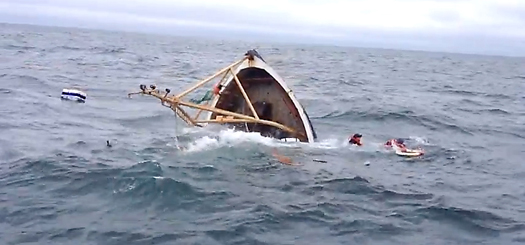
The two crew takes to the chilly water of the Irish Sea as the trawler goes down
The pair battle their way clear of the swirling danger zone before brave crew on the Tribute drag them to safety. Read more in the Irish Sun here.
The men were airlifted (see video below) to Daisy Hill Hospital in Newry after another fishing vessel, the Tribute, recovered them from the water and raised the alarm.
Requiem for Titanic Victims on 100th Anniversary
#TITANIC - Philip Hammond's Requiem for the Lost Souls of the Titanic will be staged at St Anne's Cathedral on the centenary of the tragedy, BBC News reports.
The Belfast composer has spent over three years working on the "haunting" music that will pay tribute to the more than 1,500 people who lost their lives when the TItanic sank in 1912.
His requiem uses phrases from variations of the 'Nearer My God to Thee' and takes influence from Irish folk songs from the 1792 Belfast Harp Festival.
Accompanying the music will be lyrics from the original Latin Requiem Mass sung by the Belfast Philharmonic Society, Anuna, the Schola Cantorum of St Peter's Cathedral, Belfast, and Cappella Caeciliana.
The cathedral itself will also be part of the story, with seating arranged to imitate that on a ill-fated ship.
"It is part of history and it is part of who we are," said Hammond of the Titanic story.
BBC News has more on the story HERE.
Italian Coastguard to Deliver Keynote at Dublin Conference
#COASTGUARD - Representaives of Italy's coastguard will give an account of its handling of the Costa Concordia tragedy at an international conference in Dublin next month, The Irish Times reports.
The Italian coastguard has been invited to deliver the keynote address at Search and Rescue 2012, which is being hosted in Ireland for the first time.
It is expected that this address will include a detailed account of the sinking of the cruise liner Costa Concordia last month.
At least 17 people have died and 12 are still missing after the ship ran aground on the western Italian coast. One Irish couple were among the thousands rescued from the stricken vessel.
Meanwhile, attendees at the conference - which is being hosted in the year of Ireland's charing of the EU coastguard network - will also witness demonstrations of the Irish Coast Guard's rescue helicopter fleet at Weston Airport in Leixlip.
As previously reported on Afloat.ie, Irish Coast Guard director Chris Reynolds has been charged with preparing the grounds for a permanent secretariat to be run by EU coastguard officers.
Duo Rescued from Sinking Fishing Boat in Galway
#RESCUE - BreakingNews.ie reports that two men have been rescued from a sinking fishing boat in Galway Bay this afternoon.
One of the two men on board the vessel alerted rescue services around 2pm after they began taking on water close to Salthill west of the city.
Two other fishing boats aided the duo before the Galway RNLI lifeboat crew boarded the vessel and used a pump to keep it afloat.
The stricken boat has since been towed back to the city docks.
Russian Ambassador Proposes Reward for Swanland Rescuers
#COASTGUARD - Russia's ambassador to Britain has proposed rewarding rescuers involved in the search for missing seamen in the Irish Sea last week following the sinking of the cargo ship Swanland.
As previously reported on Afloat.ie, the cargo vessel - carrying 3,000 tonnes of limestone - went down some 10 miles west of the Lleyn peninsula in north Wales in the early hours of last Sunday.
Two of the eight crew, who were all Russian, were recovered from the sea. A third was found deceased, while the remaining five are still missing.
As many as 11 coastguard rescue teams were involved in the search operation, which also saw an RAF rescue helicopter - piloted by Prince William - lend assistance.
At a meeting with the two rescued sailors in London last Wednesday, Ambassador Alexander Yakovenko commented: “What if we propose [the rescuers] to be rewarded by the Russian side?”
Russian news agency RIA Novosti has more on the story HERE.
MCIB Report on Sinking of Fishing Vessel 'Ainmire'
A breach in the engine compartment caused the fishing vessel Ainmire to take on water and sink off the coast of Scotland in April last year, according to the official report into the incident.
All crew on board the vessel were transferred safetly to another fishing boat that responded to its distress call, some 30 miles northwest of the Butt of Lewis on the morning of 29 April 2010.
The Marine Casualty Investigation Board (MCIB) report concluded that the failure of a sea water cooling pipe in the engine room was the most likely cause of the flooding, and pointed to the fact that the pipework had not been renewed during the life of the vessel.
It was also noted that the bilge pump and its motors were located under the floor plates in the engine room, and thus were inoperable when the water level had risen in the compartment.
In addition, the MCIB report found that the Ainmire has been operating without a Fishing Vessel Safety Certificate for more than six months at the time of the incident.
Though the owner had submitted a survey application and paid the required fee to the Marine Survey Office (MSO) the previous summer, a communication breakdown resulted in the required survey not being carried out before the expiration of the vessel's previous certification.
The MCIB advised boat owners and operators to be extra vigilant regarding the location of bilge pumps in their vessels.
It also warned that survey applications for certification "may not accommodate all situations", and that the issuing of a recepit is not a guarantee that an application is being dealt with.
The full report is available to download as a PDF from the MCIB website HERE.



























